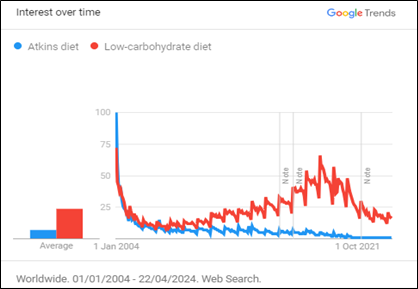From Rollo to Revival: Tipping the scales on obesity and diabetes
In ‘the Tipping Point’, Malcolm Gladwell explores how certain ideas and trends that were once niche or obscure can suddenly become pervasive. By looking at certain cases, we see how the low-carb revolution embodies many of the principles he discusses in his book, including the influence of central figures, the ‘stickiness factor’ and the ‘power of context’.
The low-carb diet is an increasingly prevalent approach to managing type 2 diabetes, obesity and other metabolic disorders by restricting the consumption of carbohydrates and sugar. For more information, visit the low-carb diet sheet here.
The first case
It’s possible there were earlier cases that went unrecorded but the military surgeon, John Rollo’s extremely detailed ‘Account of Two Cases of the Diabetes Mellitus’ in 1797, is believed to be the earliest proof that diabetes can be managed with a low-carb diet.
Captain Meredith of the Royal Artillery came to Rollo in 1796 with excessive thirst and frequent urination. His urine evaporated down to an ‘astonishing quantity’ of residue that resembled molasses. He ate as he pleased and drank up to a bottle of port wine daily along with ‘toast-water’, an old-age recipe of toast steeped in hot water for flavour. Rollo prescribed a stringent meat-heavy diet and restricted his carbohydrate intake. He was instructed only to drink water that was fortified with certain minerals. Almost immediately, his extreme thirst subsided, and he was passing much less urine daily, which showed no evidence of containing glucose. A few months later, Captain Meredith was in very good health, and he was able to return to active military duty.
Mavens, connectors and salesmen
Gladwell notes the importance of key individuals in bringing new ideas to universal acclaim. He pays particular attention to mavens who possess deep understanding and knowledge on the subject, connectors with vast networks to link ideas to people and salesmen who can act as persuasive communicators.
William Banting, a British undertaker wrote his ‘Letter on Corpulence’ in the 1863. This is considered by many to be the first diet book ever written. He documented how reducing carbohydrates helped him lose weight.
‘Dr. Atkins' Diet Revolution’ was published in 1972. He recommended a low-carb, high-fat diet for rapid weight loss and improved health. With over 15 million books sold worldwide, he epitomises the salesman Gladwell describes, charismatically advocating for a movement and communicating its merits to the masses.
In 2002, journalist Gary Taubes published ‘What if it’s all been a big fat lie?’ in the New York Times, which challenged the consensus on dietary advice at the time. In his role as a connector, his provocative article stimulated debate amongst academics and allowed the public to join in with the discourse.
Two distinct waves
At the heart of Gladwell’s book lies the tipping point itself: the moment when a trend crosses a threshold, becoming contagious and spreading rapidly throughout society. He also discusses the importance of the ‘stickiness factor’, or the ability of an idea or message to remain relevant in peoples’ minds. Although difficult to determine exactly, it is possible to glean some insights into both.
Atkins’ first diet book was published in 1972 but didn’t become a New York Times bestseller until 1997, where it remained for 5 years. Interestingly, these peak sales occurred around the same time as Gary Taubes’ seminal article.
From 2004 onwards, Google has offered data on ‘Google Trends’, a tool that allows users to observe the popularity of search terms and topics over time.

Figure 1: Data source - Google Trends (https://www.google.com/trends)
As shown here, Google searches for low-carb diets were at peak popularity in 2004 but then rapidly declined. Atkins Nutritionals filed for bankruptcy in 2005.
The Atkins diet was criticised for relying too much on anecdotal evidence and for lacking in scientific rigor. It was often dismissed as a short-term fad with no sustainability as a lifestyle choice. Beyond Atkins, broader concerns surrounding low-carb diets arose about their long-term suitability for everyone, the potential cardiovascular risks of high fat intake, nutritional deficiencies, and the negative effects of high protein consumption on the kidneys. The feasibility of maintaining a low-carb lifestyle amidst societal pressures was often questioned alongside worries about potential psychological effects like food obsession or disordered eating patterns. A blend of these factors likely detracted from the ‘stickiness’ of the diet and contributed to its falling popularity.
Following the decline in Google searches after 2004, low-carb diets started trending again from 2011 onwards. As the graph shows, the surges in popularity of the low-carb diet over time appear to occur in two distinct waves.
Bring on the data
In 2013, a GP in Southport called David Unwin faced a personal tipping point when he saw something for the first time in his career: a patient managed to put their type 2 diabetes into remission with diet alone. His curiosity led him to try her low-carb method on himself and other patients. Totally aware of the safety fears many had about the Atkins diet years prior, he started collecting data. Lots of it.
He now has over 100 type 2 diabetic patients on his register living in drug free remission. His 2020 BMJ paper is one of the most read articles the journal has ever published, and the results are astonishing. 46% of his patients who chose a low-carb lifestyle went into drug free remission. The prediabetic cohort had a 93% reversal rate. Significant improvements in weight, lipid profiles and blood pressure were also observed, alongside evidence of enhanced liver and kidney function.
He has been a great motivator of behaviour change with his patients and the public, offering an inspiring message of hope. The ‘stickiness’ of his message can be attributed in part to the compelling simplicity of it: reduce carbs, improve health. These teachings are then supplemented with user-friendly educational resources like his sugar infographics now available in 28 languages.
His commitment to evidence-based medicine through the close monitoring of his patients and willingness to share these findings have contributed to the credibility and longevity of this approach. By conducting research, publishing studies and actively engaging with the medical community, he has helped legitimise the use of low-carb diets as a therapeutic option for improving metabolic heath. His efforts align perfectly with the role of the maven described by Gladwell, as someone with deep knowledge and expertise who plays a critical role in driving the acceptance of new ideas or behaviours within a community.
Additionally, the low-carb revolution has benefited from the ‘power of context’ in which it has recently existed, another key concept in 'The Tipping Point’. Epidemiological data consistently indicates a global uptick in metabolic disease and concern for this has intensified in recent years, attracting much media attention. This has provided fertile ground for alternative dietary approaches. The proliferation of the internet and social media have further accelerated the spread of the low-carb message and helped enable this grassroots movement to flourish.
There’s more to be done
While the low-carb movement has achieved public support on account of empirical evidence and shared personal experiences, the backing of experts and authorities presents a different challenge. This requires time and scientific validation. With the accumulation of evidence, perhaps institutions will more readily accept the safety and efficacy of low-carb diets in restoring and maintaining metabolic health.
The concept of reducing carbohydrate intake to manage diabetes is nothing new, with its effects first being chronicled way back in 1796. The thriving uptake of the low-carb lifestyle illustrates many of the principles outlined in ‘The Tipping Point’. The role of mavens, connectors and salesmen have been instrumental in promoting its advantages. While identifying the exact tipping point remains elusive, book sales and Google Trends reveal two clear surges in its popularity over the last few decades. The simplicity of the message and patient educational aids have added to its ‘stickiness’ in recent years. This has been bolstered by robust scientific data proving its myriad benefits and the ‘power of context’ - growing societal concern for diabetes and obesity rates. Despite its widespread adoption by members of the public, endorsement from experts and authorities still falls short of unanimous agreement. Analysing its evolution through the lens of Gladwell’s theories, we gain valuable insights into the power of ideas, the influence of key figures and the dynamics of social change.
By Jack Smith
Jack Smith has held various professional roles within healthcare, most recently working as a clinical Pharmacist for West Knowsley PCN. He is passionate about addressing diabetes through improved patient education, behaviour change and the upskilling of clinicians.
If you would like to contribute to future newsletters or the wider event programme, please get in touch at dpcenquiries@closerstillmedia.com



)
)
)
)

)
)
.jpg/fit-in/1280x9999/filters:no_upscale())
.png/fit-in/1280x9999/filters:no_upscale())
)
)
)
